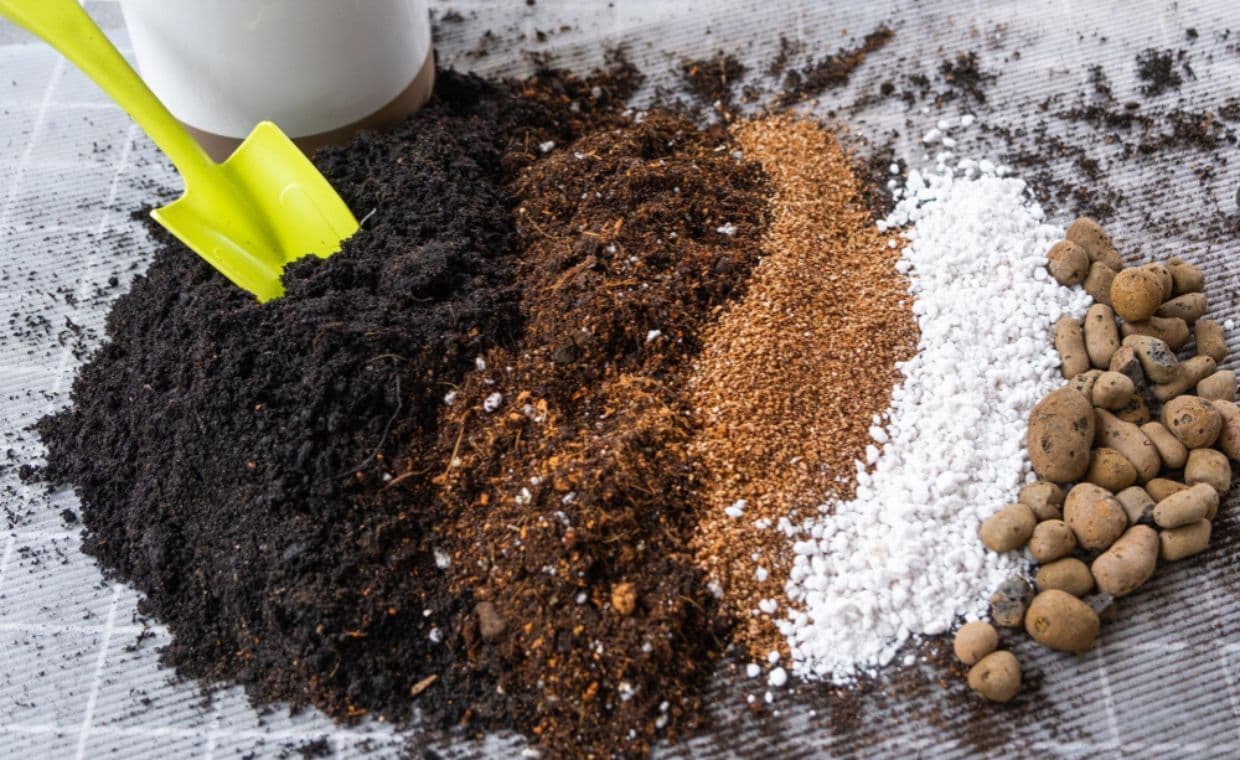
Table of Contents
Quick Summary
Here is the quick overview of organic fertilizers:
- Natural organic fertilizers are eco-friendly alternatives to chemical ones, helping maintain soil health without harming plants.
- The main difference between organic and inorganic fertilisers is that organic ones contain carbon-based compounds derived from living organisms.
- Organic fertilisers enrich the soil with nutrients through natural ingredients like compost, manure, and plant-based waste.
- Homemade organic fertilisers include manure, rock phosphate, compost, food-wash water, and coffee grounds.
- Market-available options include branded vermicompost, organic manure, and cow dung fertilisers.
- Organic fertilizers improve soil water retention, and enhance nutrient content.
- When choosing an organic fertiliser, ensure it contains natural ingredients, comes from a trusted brand, and suits your plant’s nutrient needs.
- Overall, organic fertilisers are vital for sustainable gardening, helping plants grow healthier while protecting the environment.
In this following discussion, we have explained everything you need to know about natural organic fertilizers, such as what are organic fertilizers, the advantages and disadvantages of organic fertilizers, their types, and other important aspects.
Planning and designing a garden are the easiest parts, but when it comes to maintaining it, taking care of the plants, and ensuring that they have healthy growth, the difficulty level magnifies by ten folds. These tasks are not easy as they sound because not only do you have to practice gardening but also prune the bushes, manage the foliage, get rid of pests and infected plant parts, and more. This entire process demands the gardener to develop a great sense of patience too!
However, the most crucial part of gardening is ensuring the proper and timely growth of the plants. It doesn’t matter whether you have kept the plants in pots or in a garden bed, you need to maintain the nutrition level of the greens and the soil. Even though most people use store-bought fertilizers, these products are full of chemicals that can alter the soil conditions and even cause the death of some plants.
This is why using natural fertilizer for plants is the best. You can either buy it from organic garden stores or make it at your house itself. Following is the content list for the blog:
- What is the Difference between Organic and Inorganic Fertilizers?
- What are Organic Fertilizers?
- Types of Organic Fertilizers that You Can Make At Home
- Manure
- Rock Phosphate
- Compost
- Best Organic Liquid Fertilizer: Water Used For Washing Food Items
- Coffee Grounds
- Types of Natural Organic Fertilizers That are Available in Market
- Advantages of Organic Fertilizers
- Organic Fertilizers are Environment-Friendly
- Improves the Water Retention Property of the Soil
- Adds More Nutrition to the Soil
- Does Not Harm the Plant Roots or Seeds
- Help in the Growth of Crucial Bacteria
- Disadvantages of Organic Fertilizer
- Low Nutrient Levels
- DIY Compost is Quite Complicated
- Possibly Pathogenic
- How to Choose the Best Organic Fertilizer?
Let’s have a detailed look-
What is the Difference between Organic and Inorganic Fertilizers?

The major difference between organic and inorganic fertilizers is their compounds. Organic fertilizers have organic compounds, which always contain a carbon atom, whereas inorganic fertilizers have inorganic compounds, which mostly do not contain a carbon atom.
Organic compounds are primarily the outcome or a byproduct of living beings’ activities. Organic fertilizers include composted food, rotting leaves, cow manure, etc.
On the contrary, inorganic compounds are produced by natural processes that have nothing to do with Earth’s life forms. Minerals and synthetic chemicals are used to make inorganic fertilizer, which is synthetic. A balanced inorganic fertilizer can contain ammonium sulphate, magnesium sulphate, and potassium chloride.
Go thoroughly from the following section to get a clear idea of ‘what are organic fertilizers’.
What are Organic Fertilizers?

Here is the answer to your question- what is an organic fertilizer?
As per the organic fertilizer definition, organic and natural fertilizers are made from ingredients that add more nutrition to the soil rather than altering the chemical conditions. These are eco-friendly and won’t cause any harm to your garden. For example, if you add rice water to the soil, it will act as a natural fertilizer and boost the growth of the plants.
Next, you will learn about the five types of natural organic garden fertilizers.
Types of Organic Fertilizers that You Can Make at Home
If you have a question that how to make organic fertilizer at your home, then know – there are several types of organic fertilizers, you can make at your home and won’t even have to rely on the stores. Here are some most used homemade products that will boost the plants’ growth and improve the soil conditions with ease.
Manure

Manure is one the best type of fertilizers for your plants. Manure is made by combining animal excreta (cow and goat), mainly after drying them under the sun. Both these ingredients are rich in nitrogen. However, cow dung is rich in carbon, while goat excreta have a high amount of potash. They will not only add the three most essential nutrients to the soil but also offer food for the nitrogen-fixing bacteria present in the root nodules. It is also the best organic fertilizer for seedlings.
Rock Phosphate

If you want to restore the phosphorus content of the soil, you can use rock phosphate easily. It is the best organic fertilizer for seedlings. All you have to do is buy a large chunk of the material from the market and then crush it into fine grains at your home. To make it more effective, you can add a bit of manure, crushed dried leaves, and loose soil.
Compost

Compost is one of the most popular organic gardening fertilizers that you can find in the market. However, if you want to make compost at your home, simply dump the vegetables and animal wastes into a pit and cover the area with a wooden plank. Let the materials get decomposed, as the bacteria feeding on them release nutrition to the soil.
Do not worry in case you are a beginner. Below is the composting guide for beginners that will guide you completely.
Best Organic Liquid Fertilizer: Water Used For Washing Food Items

Do not throw away the water with which you have washed different food items in the kitchen like fish, meat, vegetables, cereals, pulses, and more. Because, it is the best organic liquid fertilizer. The water contains so many essential nutrients that will improve the health of both the soil and plant.
Coffee Grounds

Coffee grounds are also one of the best types of fertilizers for plants. The most amazing natural, organic gardening fertilizer that you can prepare at the home for your garden is the coffee ground. Before you throw away the filter after brewing coffee, collect the ground and let it dry for at least a day. Once the water has evaporated, mix the powder with loose soil and then apply it to the pot or the garden bed. You can also add leftover tea leaves to the mix.
Types of Natural Organic Fertilizers That are Available in Market
Below are some natural organic fertilizers that are easily available in the market:
- NATURES PLUS Vermi Compost – Organic Manure
- NATURES PLUS Organic Fertiliser
- Ugaoo Gardenia Organic Manure
- Ugaoo Cow Manure
In the following section, we will discuss the advantages and disadvantages of organic fertilizers.
Advantages of Organic Fertilizers

The followings are the advantages of organic fertilizer:
01. Organic Fertilizers are Environment-Friendly
Natural fertilizers do not have any components that can harm the environment, which chemical products usually do. Starting from maintaining the pH of the soil at the optimal level to improving the texture of the topsoil, the fertilizers will improve the overall health without threatening the environment.
02. Improves the Water Retention Property of the Soil
The organic fertilizers help in improving the soil’s water retention property without suffering from clogging and overflowing. Therefore, the plant roots will constantly get moisture and won’t suffer from wilting or desiccation.
03. Adds More Nutrition to the Soil
One of the major benefits of using natural organic fertilizers is their high level of nutrition needed for proper plant growth. Besides, you can choose products having specific nutrients needed by the plant species so that you can ensure healthy growth during the lifecycle.
04. Does Not Harm the Plant Roots or Seeds
Since these fertilizers are made from organic ingredients, they don’t have any harsh chemicals. Therefore, the plants will be safe and the roots can grow deeper into the soil easily. Apart from this, the fertilizers will add a level of protection to the soil from pests and infections.
05. Help in the Growth of Crucial Bacteria
These fertilizers will promote the growth of bacteria required for the plant’s growth and survival. For example, a nitrogen-based organic fertilizer will help the nitrogen-fixing bacteria to supply proper nutrients to the plants.
Disadvantages of Organic Fertilizer

The following are some disadvantages of organic fertilizers:
01. Low Nutrient Levels
More often, the presence of nutrient level in organic fertilizer is low.
02. DIY Compost is Quite Complicated
If you love DIYs and want to compost on your own, it’s a little complicated and untidy process.
03. Possibly Pathogenic
Some pathogens may be left in the compost after incomplete composting which can cause problems for human and environmental health.
How to Choose the Best Organic Fertilizer?

As you know the pros and cons of organic farming, be precise while choosing the fertilizer for your plants. If you want to buy the natural fertilizer for plants from the market, then be very cautious before making the choice.
- The fertilizer should have all organic and natural ingredients.
- Make sure to go for a branded product rather than the local, loose fertilizer.
- Do not value money over product quality, as most cheap fertilizers are full of chemicals.
- Also, check whether the chosen type of fertilizer for plants is perfect for them or not. For example, if the plant has nitrogen nodules, go for a product having more nitrogen content.
Conclusion
Fertilizers play a crucial role in determining the health and growth of plants. Therefore, you shouldn’t compromise the product quality at the time of purchase. Nevertheless, if you want to make the same at your home, choose the ingredients properly and make sure that they aren’t spoiled or suffered from rotting, and I hope this article on natural organic fertilizer will help you with the same and clear all your doubts of what are organic fertilizers.
Now that you have all the necessary information on natural organic fertilizer, I think you must go through below garden design ideas, which will help you design your garden on your own.
Garden Design Ideas | Do’s & Don’ts For Your Home Gardens!
FAQs on Natural and Organic Fertilisers for Your Garden
1. What are Organic Fertilisers?
Organic fertilisers are natural, carbon-based materials derived from plants, animals, or minerals that enrich the soil with nutrients and improve its texture without using synthetic chemicals.
2. What is the Difference Between Organic and Inorganic Fertilisers?
Organic fertilisers come from natural sources like compost, manure, and coffee grounds, while inorganic fertilisers are made from synthetic chemicals such as ammonium or potassium compounds. Organic options are eco-friendly but act slowly than inorganic ones.
3. What are the Best Types of Organic Fertilisers for Home Gardening?
The best organic fertilisers you can make at home include compost, cow or goat manure, rock phosphate, coffee grounds, and even water used to wash vegetables, all of which naturally nourish plants and the soil.
4. What are the Advantages of Using Organic Fertilisers?
Organic fertilisers are eco-friendly, enhance soil fertility, improve water retention, promote beneficial microbes, and protect plant roots from chemical damage, ensuring long-term plant health.
5. What are the Disadvantages of Organic Fertilisers?
Organic fertilisers have lower nutrient levels, may take longer to show results, and DIY composting can be messy or attract pathogens if not done properly.
Author Bio
Sanjukta Ganguly – I am Sanjukta Ganguly from Kolkata. I have 9+ years of experience in content writing. I have written for multiple niches and genres like, health, travel, pregnancy, love and relationship, dating, hosting services, and WordPress, Press Release, Web Designing, Case Study, Thesis, Proof Reading, Academic Writing, etc. I can handle the work of 4000-5000 words daily.































